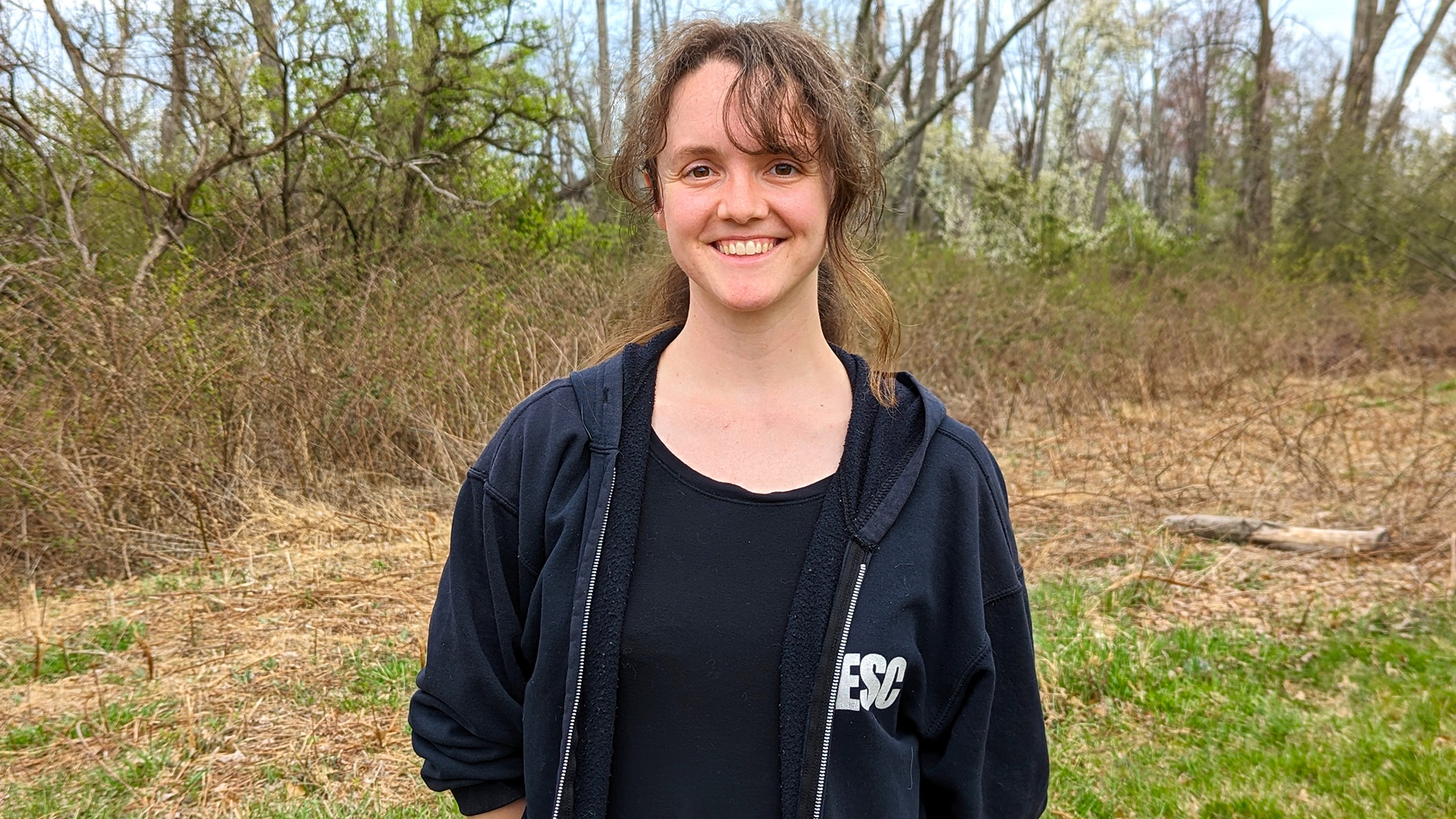If you’ve ever seen the popular anime series My Hero Academia, you know what a quirk is. For the uninitiated, quirks are essentially superpowers, and they can run the gamut of possibilities.
In Danielle Smith’s case, her quirk is an uncanny ability to identify any bird she hears and spot bird’s nests that would otherwise remain hidden to most everyone else.
“There are two woodpeckers chasing each other over there,” said Smith while on the Ambler Campus trails. “There’s been cardinals and flickers and two or three red-bellied woodpeckers fighting — they are very territorial right now as they’re trying to establish nest holes. Sometimes I stress my mom out a little bit because I (identify birds) while I’m driving.”
Smith, a recent Temple Ambler Field Station Research Intern who graduated with a degree in Biology from the College of Science and Technology, has heard the call of the outdoors — and birds in particular — for as long as she can remember.
“I’ve always been pretty interested in being outdoors and being around animals,” she said. “I’ve been interested in a lot of diffident things, but I started taking bird summer camps at a local YMCA and I joined their World Series of Birding team and then their outdoor environmental education club and I’ve never looked back.”
Arriving at Temple University as a transfer student in 2021, Smith said the difference between her previous institution and Temple “was that I had a lot more options.”
“It’s been very enjoyable because I’ve been able to explore my opportunities while also being able to talk to people with a wide range of experiences, which has been exciting,” she said. “I have done research in the past with other organizations and groups in my area. When I got into Temple and I learned about the Field Station, I really just wanted to get back out into the field and also be more hands-on with the data input.”
During her time with the Field Station, Smith worked collaboratively with her fellow research interns to study the ephemeral pools created in the deep pits in the earth left by uprooted trees when the tornado struck Temple Ambler in 2021.
“I worked on the ephemeral pools in both the sites impacted within the Temple Forest Observatory and over at Robbins Park, which is near Temple Ambler and was undisturbed,” she said. “I’ve also been helping to process some of the Field Station’s trail camera photos. We are monitoring the growth of the trees after the disturbance in addition to monitoring the woods to determine what organisms are actually using it. With the pre- and post-disturbance information, it provides a really great balance of data.”
Smith’s personal research project, naturally, focused on birds.
“My project compared bird activity in the undisturbed and disturbed sites at Temple Ambler, primarily looking at their behavior in addition to their species richness to figure out if there is any indicator of certain species avoiding either the disturbed or undisturbed locations,” she said. “The goal of the project is to see if there are birds that are coming back into the campus that are able to use the heavily disturbed areas — to still eat, forage, build nests and raise their young.”
During a walk on the trails behind the Ambler Campus Learning Center, Smith easily identified songbirds such as cardinals and mockingbirds as well as “several red-bellied woodpeckers calling and a series of downy woodpecker, which are a type of small woodpecker.”
“Those are great indicators that there is dead wood around here that is still standing. While it might have been damaged by wind throw, it’s giving the birds a place to live and a place to forage for food,” she said. “Birds fascinate me because they are all so different and they are everywhere — they are great indicators of habitat. Some are really easy to find but some are so sensitive that you feel really lucky when you have the opportunity to see them. I’ve spent the last 18 years of my life just chasing birds around. I try to work with birds in everything I do.”
Hands-on research experience, Smith said, “I found very important as a student.”
“Hands-on research allows students to explore their options for what they want to do when they graduate. When I started my college journey, I was actually an English major,” she said. “I found out very quickly that wasn’t for me, so I went and found a bunch of opportunities in the field doing different research jobs. I found getting out there and actually performing and learning what a job would be like, especially field research, is essential.”
After graduation, Smith has wanted to give back to the place where her passion for the outdoors truly took flight and inspire the next generation to get out and explore the world around them.
“I’m going continue to work at the Upper Main Line YMCA where I was an environmental educator. I’m head of the program that I grew up in,” she said. “It’s bringing nature education and outdoor education to kids between ages 10 and 18. I’d like to expand that program to be a lot larger and provide more students with different backgrounds the opportunity to get outside and enjoy nature.”
Through the Temple Ambler Field Station Research Intern program, students gain advanced training by engaging in hands-on research internships that bring alive the excitement of science through an inquiry-based experience. Student interns work alongside researchers in the field to support ongoing projects and can develop investigations of their own.
Students interested in becoming a Field Station Research Intern, should reach out to the Temple Ambler Field Station at [click-for-email] with their name, why they are interested in working with the Field Station, current transcripts, and current resumé.
Learn more about the Temple Ambler Field Station at https://ambler.temple.edu/fieldstation.

